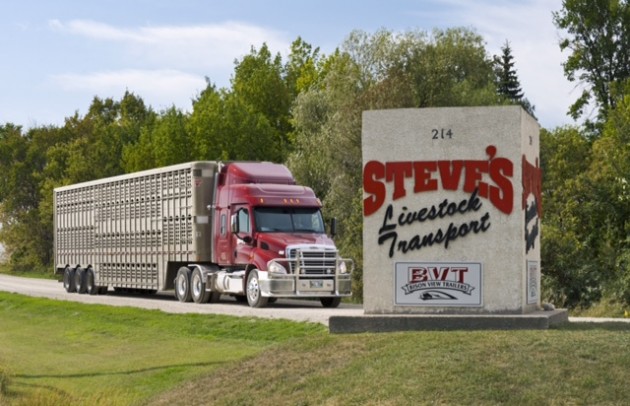Keeping it clean
BLUMENORT, Man. – Steve Brandt started off with a single truck nearly 30 years ago and since then has built the business to the point where he claims on his Web site that his company has become “the largest commercial livestock carrier in North America,” moving some 2,500 heads of cattle and 150,000 pigs each week.
That’s some growth, but to listen to Brandt tell it, getting to this point wasn’t all that big of a deal.
“We were sort of at the right place at the right time,” Brandt told Truck West in a recent interview. “The pork industry was taking off and was crying out for bio-security and the industry was not willing to provide that option for people (at the time) – and we were. We were just getting out of the gate and the pork sector was asking for something – and we basically provided what they were asking for: whatever it takes to clean the equipment to their standards.”
That strategy has taken Brandt and his company from that solitary truck to today’s empire of 135 power units with a staff of about 375 spread across the company’s operations from Manitoba to Alberta, driving and supporting them.
Brandt hasn’t strayed too far from his roots in building the biz, however, despite growth and a certain amount of branching out.
“I started off trucking mainly dairy cattle and some feeder cattle and show cattle,” he said. “My wife was dispatching and doing accounting and running the household and I was in a truck – and that’s how we started.”
Now, the company trucks cattle, pigs and even some dry freight, and has also spun off a division known as Dawson Road Transfer, which services customers in Winnipeg and southeastern Manitoba. Brandt credits the success to the fact that “we have a bunch of good people” as well as the company’s focus on healthy hauling.
“I think (the disease prevention focus) has probably been the biggest thing,” he said. “If you can help somebody keep a disease out of a facility and we keep our Canadian herd health strong, that’s something that we try to provide and that’s how we try to separate ourselves from everybody else.”
Another competitive advantage Steve’s Livestock Transport can claim is that the company is certified by the Customs-Trade Partnership Against Terrorism (C-TPAT), which means its trucks require minimal cargo inspections and can receive priority status at North American border crossings – kind of a “Nexus-type thing” for livestock, Brandt said. The company also adheres to standards set by the Canadian Border Safety Agency, which can help ensure fewer hassles at the 49th parallel.
Steve’s Livestock Transport now hauls across eastern and western Canada as well as the mid-US states.
Despite the company’s steady growth, however, Brandt thinks business this year has been pretty flat.
“Not a big change (from last year),” he said, noting that while the BSE (bovine spongiform encephalopathy, or mad cow disease) scare of years past has mostly come and gone, “the latest disease that we’ve fought with is PED (porcine epidemic diarrhea, see the Alberta Pork feature on this page). We try to keep it out of Canada, so…we’ve been scrapping with it.”
Brandt tries to foster a closely knit atmosphere among his employees, treating them as an extension of his family to help ensure they stick around.
“I think we have a real family feel and not the big corporate feel, and I think that’s partly where we’re different (from other companies of our size) – people feel like we actually care about them and their families. Trucks, equipment, tractors, trailers buildings; all that stuff is pretty easy to deal with, but (the business) is really all about the people. It’s all about having the right people together to accomplish your end goal.”
Brandt noted that his son also works in the company, dispatching, and since his wife was involved in the earlier days of the business as well, there’s real family to help maintain that family feel and image.
Not surprisingly, safety is also a priority for Steve’s Livestock Transport.
“We want to be known as a company that’s compliant on all fronts, so running compliant is high on our list,” Brandt said.
Besides a safety foreman, the company also has its own wash bay facilities and does its own repairs and maintenance at its locations.
Brandt said the biggest challenge currently facing his company is that the fall rush of cattle movement is about a month-and-a-half behind schedule from normal.
“Cattle movements generally start in the middle of August, and they’re moving (now) but extremely slowly,” he said, “so we’ll be moving a lot more animals in a lot less days. It’s going to create a real bottleneck.”

Have your say
This is a moderated forum. Comments will no longer be published unless they are accompanied by a first and last name and a verifiable email address. (Today's Trucking will not publish or share the email address.) Profane language and content deemed to be libelous, racist, or threatening in nature will not be published under any circumstances.